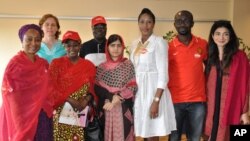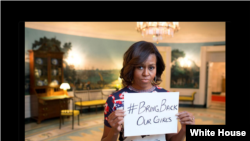Pakistani education activist Malala Yousafzai is celebrating her 17th birthday in Nigeria on Monday with promises to work for the release of some 219 schoolgirls who have been held by Islamic extremists for three months.
Malala survived being shot in the head by the Taliban for campaigning for girls' education in 2012.
On Sunday, she met parents of the more than 200 girls who were kidnapped by the militant group Boko Haram from a school in the northeastern village of Chibok in April.
Boko Haram, inspired by the Taliban, say they are fighting to establish an Islamic state in religiously mixed Nigeria.
The group, whose name means “Western education is sinful,” has killed thousands and abducted hundreds since launching an uprising in 2009.
Meets with parents
Some of the parents broke down in tears as Malala spoke at a hotel in the capital Abuja on Sunday.
“I can see those girls as my sisters ... and I'm going to speak up for them until they are released,” said Malala, who was to meet President Goodluck Jonathan on Monday. Her 17th birthday was on Saturday.
“My birthday wish this year is "Bring Back Our Girls' now and alive,” she said on Monday, using the social media slogan that has been picked up around the world to demand freedom for the girls.
“I'm going to participate actively in the #Bring back our girls campaign, to make sure that they return safely and they continue their education," Malala said.
On Monday, Malala appealed to the Nigerian government to dedicate more money to education, to drastically reduce the hundreds of thousands of children who are out of school in the country, not just in the northeast area that is under a state of emergency and where Boko Haram has targeted schools, killing hundreds of students.
The girls' abduction drew unprecedented international attention to the war in Nigeria's northeast and the growing security risk that Boko Haram poses to Nigeria, Africa's leading energy producer.
A #BringBackOurGirls Twitter campaign supported by Michelle Obama and Angelina Jolie heaped pressure on authorities to act, and Jonathan pledged to save the girls, drawing promises of Western help to do so.
Several weeks on, the hostages have not been freed and media interest has waned.
Parents angry
Around 200 Nigerians gathered in the Unity Fountain park in central Abuja on Sunday to call on authorities to explain what they are doing to get the girls out.
“Nobody has told us anything about where the girls could be, what they are doing to try to rescue them. In three months, we've heard nothing,” said Haruna Fetima, one of the parents at the gathering. “We live in Chibok, and we haven't seen any soldiers or police in the area since the attack.”
Jonathan has not met with any of the kidnapped girls' parents, nor with Nigerian activists who started the worldwide movement. He has drawn international condemnation for his government's failure to quickly rescue the students.
In May, Jonathan canceled a planned trip to Chibok. And soldiers and police prevented activists from marching to his presidential village in Abuja, the capital, to give him written demands the same month.
Boko Haram
Boko Haram
- Based in the northeastern city of Maiduguri
- Self-proclaimed leader is Abubakar Shekau
- Began in 2002 as a nonviolent Islamist splinter group
- Launched uprising in 2009
- Has killed tens of thousands since 2010
- Boko Haram translates to "Western education is sinful"
- Wants Nigeria to adopt strict Islamic law
Boko Haram, now considered the main security threat to Nigeria, is growing bolder.
Police said on Saturday they had uncovered a plot to bomb the Abuja transport network using suicide bombers and devices concealed in luggage at major bus stations.
Group leader Abubakar Shekau also put out a new video last week in which he repeated his demands that the government release scores of detained insurgents in exchange for the girls' freedom.
The government has so far refused.
Some see Nigeria's local #BringBackOurGirls campaign as a rare, albeit small, piece of civil activism in a nation famous for its shoulder-shrugging indifference in the face of atrocities or bad governance.
“The negative side of our resilience ... is that things that would compel other citizens to demand accountability, demand answers, wouldn't move the Nigerian,” said Oby Ezekwesili, a chartered accountant who has spearheaded the campaign to get the girls freed.
“That has been broken. ... People are saying 'We can't leave 219 girls and just get on with our lives.' "
Some information for this report provided by Reuters and AP.






